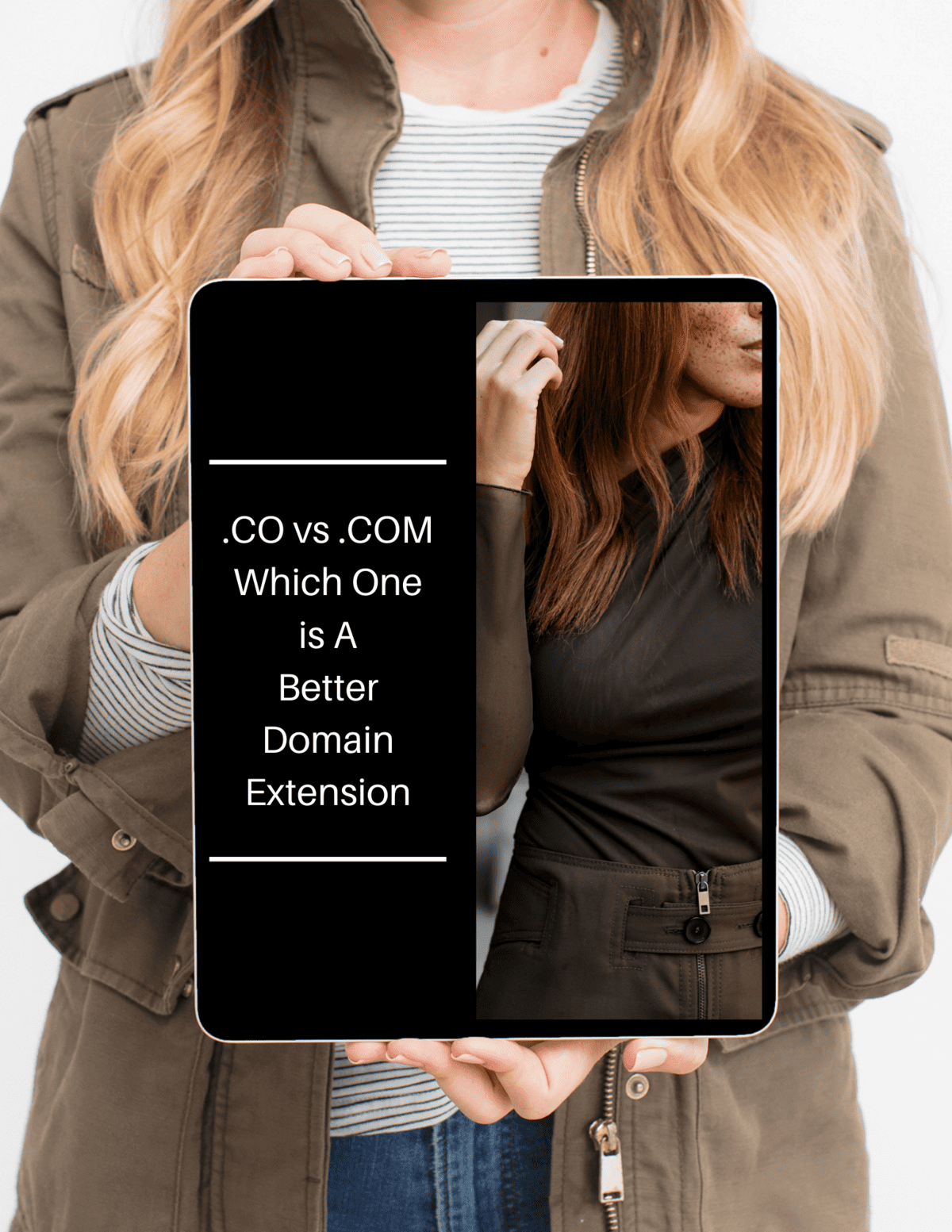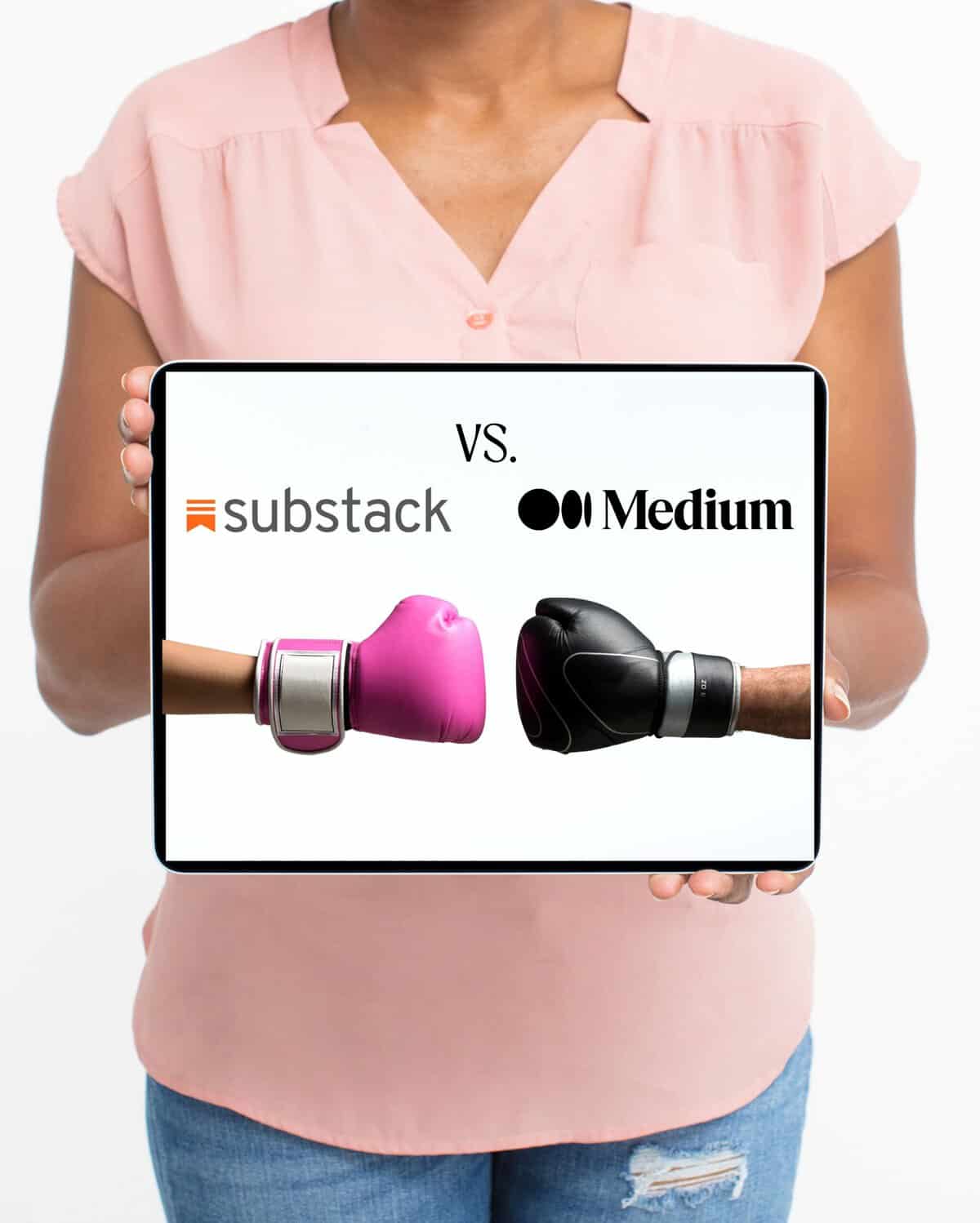This page may contain affiliate links. Please read my disclosure for more information.
You’ve come up with the right name for your business, and now you must choose the best domain extension. Choosing a new domain extension is like picking the perfect outfit for a special occasion. It’s a decision that can shape your online identity and make a lasting impression. As someone who loves buying domains and digital real estate, I know the importance of making the right choice.
In the online world, your domain name is your address. It’s how people find you, just like a street address for your brick-and-mortar store. But unlike a physical address, your domain name ends with an extension, like .com or .co. This extension acts like a neighborhood, giving people a hint about what they might find there.

.com – Think of .com as the established downtown – trusted, familiar, and packed with big brands. Picture Main Street, bustling and trusted; everyone knows it. That’s .com – familiar, reliable, and perfect for established brands. But finding your ideal web address here can be tricky, like nabbing the corner shop – expensive and not always available.
.co – .co, on the other hand, is the cool, up-and-coming, new district – vibrant, innovative, and buzzing with startups. Think of a trendy tech district that is young and buzzing. That’s .co – modern, cool, ideal for startups and fresh ventures. There are plenty of open storefronts (available domains), but maybe not everyone knows the street yet.
What are Domain Extensions TLDs?

There are over 1.13 billion websites on the internet. Only a small percentage (less than 20%) of these sites are actually used and updated. Several organizations monitor TLD domain extensions. One of them is ICANN. ICANN oversees TLDs on the internet, while domain registrars like GreenGeeks or SiteGround help users register and manage domain names under these TLDs.
Top-level domains (TLDs) are the highest level of the domain name system (DNS) hierarchy. They are the last part of a domain name that follows the final dot, such as .com, .org, .net, and more. TLDs play a crucial role in organizing and categorizing websites on the internet. They help users identify the purpose or nature of a website. For instance, .com is a more common TLD and commonly associated with commercial websites, .org with organizations, and .net with network-related entities.
TLDs are essential because they provide context and credibility to a website’s domain name. When choosing a TLD, website owners should consider the audience they want to reach and the image they want to project.
Which Domain Extension Should You Use: .COM or .CO?

If you’re starting a new business and can find a suitable .COM domain, it’s often a good choice due to its widespread recognition and trustworthiness. It’s the most popular domain extension.
If you can’t find an available .COM domain that suits your brand or if you want a shorter and more memorable domain name, .CO can be a viable alternative. The .CO domain was originally the country code top-level domain (ccTLD) for Colombia. If your target audience is primarily located in Colombia, .CO might be more relevant and appealing. Alternatively, choose a generic domain extension.
What is a generic domain extension?

A generic domain extension, also known as a generic top-level domain (gTLD), is a category of domain extension in the Domain Name System (DNS) not associated with a specific country or geographic location.
Examples of generic domain extensions (gTLDs) include:
- .com – This is one of the most widely recognized and used gTLDs. It is associated with “commercial” and is commonly used for various types of websites, including businesses, organizations, and personal websites.
- .org – Originally intended for non-profit organizations, .org is now used by a wide range of entities, including non-profits, community groups, and individuals.
- .net – Originally designated for network-related organizations, .net is now used by a variety of websites, often associated with technology and networking.
- .info – This gTLD is generally used for informational websites, such as blogs, wikis, and resource sites.
- .biz – Designed for businesses and commercial purposes, .biz is an option for companies looking to establish an online presence.
- .name – This gTLD is intended for individuals, allowing them to register domain names in the format “firstname.lastname.name.”
- .pro – Targeted at professionals, .pro is often used by individuals and businesses in fields like law, medicine, and accounting.
- .aero – This specialized gTLD is reserved for the aviation industry and related organizations.
- .museum –Designed exclusively for museums, this gTLD is used by museums worldwide.
- .coop – Reserved for cooperatives, .coop is used by cooperative businesses and organizations.
Ultimately, your choice should align with your branding, business goals, and the availability of domain names that match your brand identity. It’s also a good idea to consider securing both .COM and .CO domains if they are available to prevent any potential confusion or loss of traffic to competitors and domain squatters.
The choice between using a .COM or .CO domain extension depends on your specific circumstances and goals.
Pros and Cons of .co vs .com

Here’s the list of pros and cons when choosing between .CO and .COM for online businesses:
.CO
Pros:
- Availability – .CO is relatively new compared to .COM, so there’s a better chance of finding your desired domain name with .CO.
- Modern and trendy – .CO can give your brand a fresh, innovative image. Some companies choose .CO to create a unique and modern brand identity.
- Shorter and memorable – .CO is a short and easy-to-remember domain extension.
Cons:
- Less recognition – .CO is not as widely recognized as .COM, potentially leading to confusion.
- SEO impact – Websites with .CO might have a slightly lower search engine ranking initially.
- Limited target audience -.CO might be more relevant to the tech industry or startups.
.COM
Pros:
- Global recognition and trust – Instantly recognized and trusted worldwide.
- SEO advantage in search rankings (could rank higher) – .COM domains often have an edge in search engine rankings.
- Popularity – .COM is the most widely recognized and used domain extension globally. It is often the default choice for most businesses and websites.
- Wider audience reach – Appeals to a broader audience base.
- Credible and established – Signifies a well-established online presence which can positively impact your website’s credibility.
Cons:
- Limited availability of popular names – Potentially popular domain names with .COM might already be taken. Given its popularity, finding a short, memorable. COM domain name can be challenging.
- Can seem generic for some brands – May not offer a unique brand identity.
- Higher cost compared to some other TLDs – .COM domains can be more expensive than alternative extensions.
Key Considerations When Choosing Between .co vs .com

Consider your brand and target audience. When deciding between a .COM and .CO domain, it’s crucial to consider your brand identity and target audience. Your choice of domain extension should align with your brand image and resonate with your intended target market. For example, if your brand emphasizes modernity and innovation, a .CO domain might be a better fit. Conversely, if your brand seeks a more established and traditional image, .COM could be the way to go. Think about the message you want to convey to your audience and select the extension that supports that message.
Domain name availability. Before finalizing your decision, it’s essential to check the availability of your desired domain name with both .COM and .CO extensions. While .COM domains have been in use for decades and are highly sought after, .CO domains offer more availability. However, securing a memorable and relevant domain name is crucial for your online identity. Explore options and variations to ensure your chosen domain is unique and represents your brand effectively.
SEO consideration. Search engine optimization (SEO) is a critical factor in driving organic traffic to your website. While .COM domains have historically held an advantage in search rankings due to their popularity and trustworthiness, .CO domains have made strides in this regard. Google and other search engines have evolved to recognize and treat different domain extensions fairly. It’s important to focus on high-quality content, relevant keywords, and good SEO practices regardless of your chosen extension. Over time, both .COM and .CO domains can perform well in search results with the right SEO strategy.
Budget. Budget considerations play a significant role in choosing between .COM and .CO domains. .COM domains can often be more expensive than .CO domains due to their established demand. When planning your website, factor in the cost difference between these extensions. Determine how the domain registration fee aligns with your overall budget and business goals. Keep in mind that while .COM may have a higher initial cost, it can offer long-term benefits in terms of user trust and recognition.
Selecting the appropriate domain extension involves carefully evaluating your brand, target audience, domain name availability, SEO strategy, and budget. By weighing these key considerations, you can make an informed decision that best suits your online presence and business objectives.
Newer TLDs

In recent years, the domain landscape has witnessed the emergence and popularity of new top-level domains (TLDs) beyond the traditional ones like .COM and .CO. TLDs like .io, .app, and .store have gained prominence, each catering to specific niches and industries.
These new TLDs can provide a fresh and meaningful approach to branding and online presence. However, like any domain extension, their effectiveness depends on how well they align with your brand, audience, and industry.
Choosing a Strong Domain Name

Regardless of the TLD you choose, a strong domain name is a critical component of your online identity. Your domain name is often the first impression users have of your website. It should be:
- Memorable – Easy to remember and type.
- Relevant – Reflective of your brand, industry, or content.
- Unique – Stand out from competitors.
- Brandable – Convey your brand’s personality and values.
Tips for Choosing and Registering the Right Domain:
- Brainstorm and Research – Begin by brainstorming domain name ideas that align with your brand and objectives. Conduct research to ensure your chosen name isn’t already in use or trademarked.
- Keep It Short and Simple – Shorter domain names are easier to remember and type. Avoid long and complex names that may lead to user errors.
- Keyword Consideration – If relevant, incorporate keywords related to your industry or niche in your domain name. This can boost your website’s search engine visibility.
- Avoid Hyphens and Numbers – Hyphens and numbers can make domain names harder to remember and can lead to confusion.
- Check TLD Availability – Ensure your desired domain name is available with the TLD you want, whether it’s .COM, .CO, or another extension.
- Consider Branding – Think about how your domain name contributes to your overall branding strategy. Does it convey the right message and image for your business?
- Act Quickly – Once you’ve decided on the perfect domain name, register it to secure it before someone else does.
- Renew Regularly – Keep track of your domain’s expiration date and renew it in a timely manner to avoid losing ownership.
Best Popular TLD Alternatives for a Business Website

While .com remains the undisputed king of domain extensions, it’s not the only option for starting your online business. Many alternative TLDs offer innovative choices to build a unique and memorable brand presence. Here are some popular extensions:
- .io – This sleek extension screams digital innovation and is ideally suited for tech startups, software companies, and online platforms. Its short and catchy nature enhances brand recognizability.
- .app – Clearly communicate your website’s functionality with this extension, ideal for mobile apps, SaaS platforms, and any business focused on providing digital solutions.
- .tech – Join the community of forward-thinking companies with this dedicated TLD for the technology sector.
- .ai – The .ai domain extension is associated with the country of Anguilla, but it has gained popularity beyond its geographic origin. The .ai domain extension is often associated with artificial intelligence (AI) due to its abbreviation. Many tech startups and technology companies related to AI, machine learning, and technology use .ai domains for their websites.It’s a popular choice for businesses, startups, and organizations involved in AI research, development, and applications.
- .design – Showcase your artistic flair and attract clients seeking creative services with this dedicated extension for designers, artists, and creative agencies.
- .photo – Photographers, videographers, and anyone in visual content can find their perfect home with this domain that instantly speaks to their expertise.
- .store – E-commerce businesses can clearly define their purpose and stand out with this extension tailored for online shops and retail experiences.
- .org – Non-profit organizations, educational institutions, and charities can build on their established reputation with this trusted and familiar extension.
- .biz – While slightly dated, .biz can still be relevant for business-to-business companies or professional service providers seeking a clear indication of their target audience.
Conclusion
The choice between a .COM and .CO domain extension is a decision that can significantly impact your online identity and brand presence. As you navigate this critical choice, consider your brand image, target audience, domain name availability, SEO strategy, and budget. Both .COM and .CO domains offer unique advantages and challenges, making it essential to align your decision with your specific circumstances and goals.
While .COM enjoys global recognition and trust, .CO provides modernity, innovation, and shorter, memorable domain options. The decision ultimately hinges on your branding objectives and the availability of domain names that resonate with your brand identity.

If you’re ready to build your website, create an online business, and start marketing, check out Go High Level. It’s an all-in-one sales and marketing platform with endless possibilities for website management, marketing automation, and customer engagement.







+ show Comments
- Hide Comments
add a comment